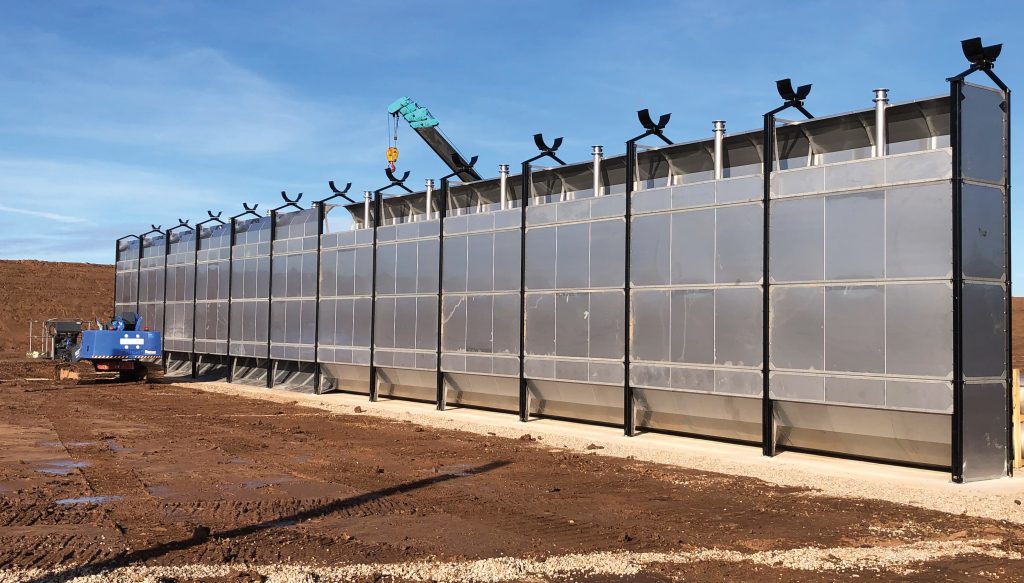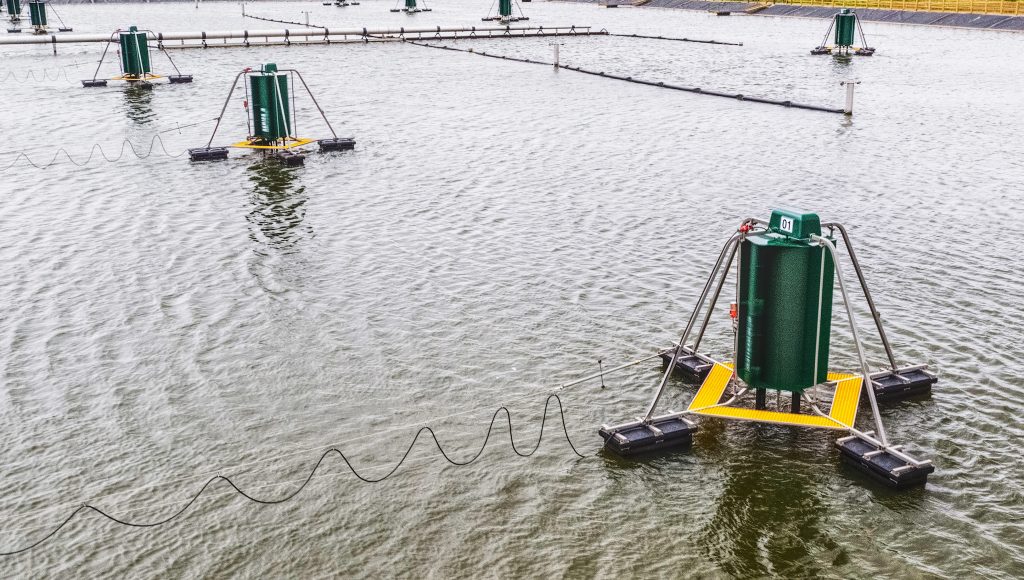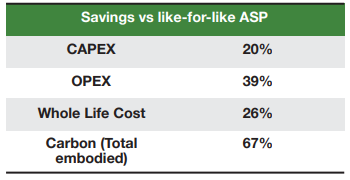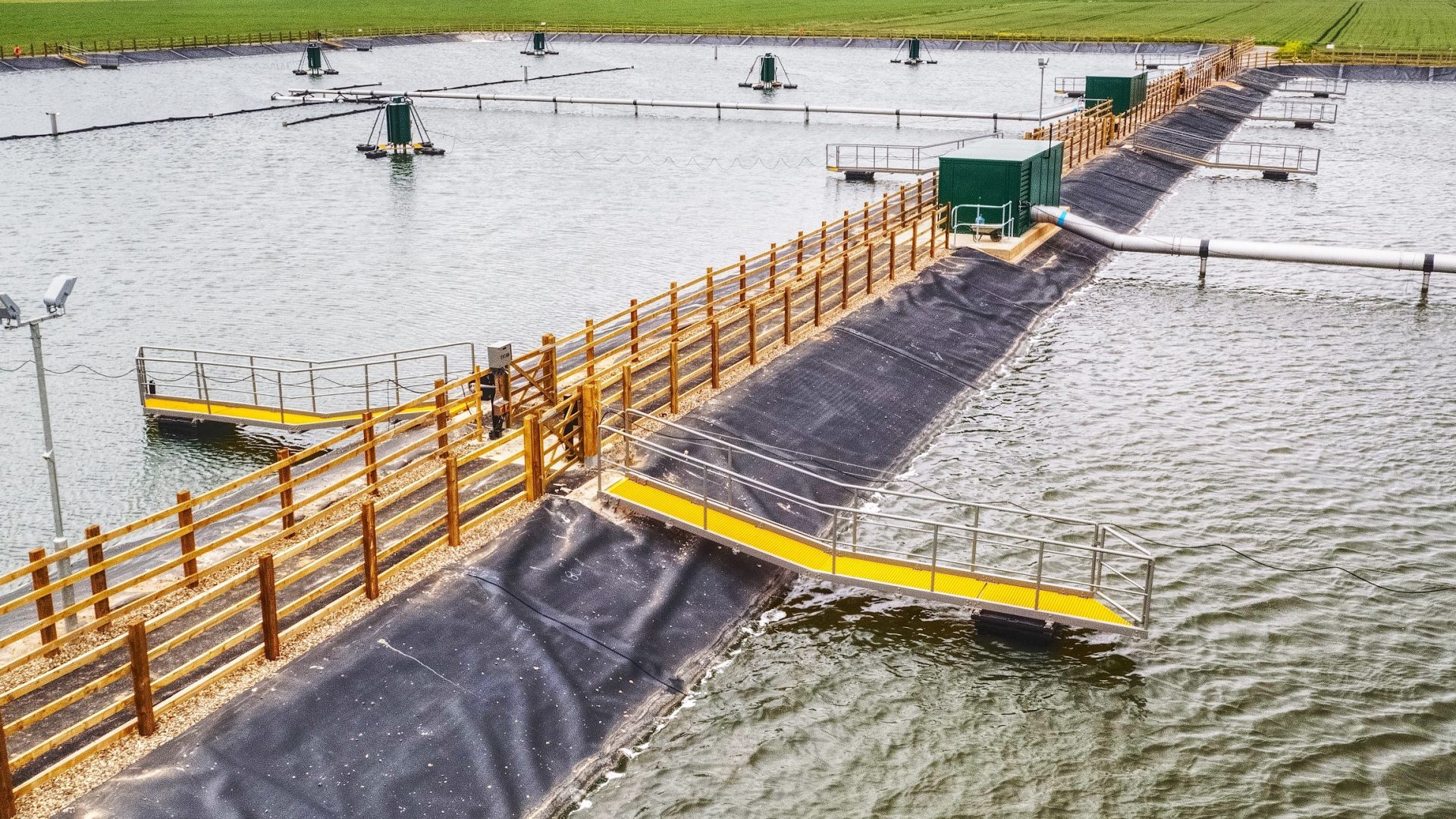Renewable energy windpower. No CSOs/stormwater overflows. Fully natural bio process. Extremely low carbon footprint. No sludge. No odour. Yorkshire Water adopts unique “Greener”, Nature-Based, dramatically lower carbon footprint wastewater treatment system to serve 7,500 to 15,000 population including stormwater & seasonal tourist loads.
Wastewater treatment has started at Yorkshire Water’s first new treatment works in 20 years! According to Yorkshire Water’s Communications Advisor John Bond, “Our existing facility in Hollym, near Withernsea needed to be replaced as it is now only 40 metres from the sea due to rapid coastal erosion in the area. By building a new treatment facility inland, we were able to look at new, alternative options for treating the town’s wastewater. Our proposal is a step away from traditional treatment works and means we are opting for a much greener, more environmentally friendly option. The new proposal means construction times are reduced, traffic movements can be minimised and once finished, the site will be virtually noise free. In addition, visual impacts and the risk of odour will be greatly reduced.”

Finding greener, time-proven technologies
Bond continued: “The new Aero-Fac® technology as supplied by the UK-based Gurney Environmental will be more sustainable and has a much lower carbon footprint as it uses little energy and is able to treat the wastewater to an excellent standard. We feel Gurney Environmental’s experience and track record provide us with the best solution for both ourselves and our customers for the future.”
Using renewable energy and a nature-based solution for treating wastewater more affordably and sustainably
The decision by Yorkshire Water to employ a natural, pure biological process enhanced by windpower — a low carbon footprint renewable energy source — results in the new Withernsea WwTP’s ability to operate at extraordinarily low costs and environmental impact for the next 20+ years.
Startup of the new Aero-Fac® WwTP at Withernsea followed 4 years of joint study and planning by Yorkshire Water, their consultant, Stantec and Gurney Environmental, the process and equipment supplier. Yorkshire Water had spent considerable time and effort researching various options but saw excellent benefits from the well-proven and time-tested “Green” Aero-Fac® technology that has been successfully used elsewhere in England and Scotland over the past two decades.
Twenty-two years ago in 2000, Montgomery Watson Projects (now Stantec) constructed the first Aero-Fac® WwTP in the UK for Tayside Regional Council/North of Scotland Water Authority (NoSWA) at Errol, Scotland. In 2019 Gurney Environmental and Stantec worked with Yorkshire Water to develop Yorkshire’s new variable flow 7,500-15,000 Population Equivalent (PE) WwTP at Withernsea, which was selected in place of a more conventional, higher carbon footprint activated sludge plant that had been initially proposed.

Meeting the challenges of climate change including serious stormwater overflows
Aero-Fac® was selected because it is uniquely suited to meet the many challenges of climate change, including meeting new legal requirements for stormwater overflow containment (CSOs). Unlike traditional treatment works options, the significantly greener option Aero-Fac® offers an extremely low carbon footprint, dramatic energy savings through the use of renewable energy, no costly sludge removal or handling, plus lower cost, nature-based, energy-free disinfection, thereby making effluent suitable for irrigation water re-use or safe-bathing waters whether discharged to river or sea. The nearby Northumbrian Water’s new Waren Mill Aero-Fac® WwTP as an example has been operating odour-free and sludge free with over 10x flow/load variation, and automatically handles storm surges/CSOs without operator intervention or problematic discharges. Yorkshire Water’s new Withernsea WwTP likewise has been designed to automatically accommodate a 2x flow/load variation and CSO/storm surges without operator intervention.
Lower-cost, more sustainable, natural/greener disinfection utilised

As an example of a “Greener”, nature-based, lower maintenance and cost approach, the UV system typically required by the Environment Agency was engineered out of the Withernsea WwTP as a result of monitoring carried out by Stantec at other Aero-Fac® wastewater treatment plants around the UK that demonstrated that the WwTP had met the discharge requirements via a greener, nature-based method without the need for expensive, higher carbon footprint traditional UV.
The unique combination of inherent disinfection provided by the natural biochemical process, enhanced by the continual gentle mixing provided by Gurney Environmental’s renewable energy wind powered SERIES 3 aerator/mixers ensure that cell contents are repeatedly exposed to the sun for effective natural UV kill.
This inherent benefit — combined with longer retention/stabilisation times — produces an effluent that is safe for irrigation water reuse, which according to the EU and various articles and papers on climate change, is going to be needed in the future. This also has the advantage where wastewater treatment systems can operate with better disinfection capabilities and require smaller or even no costly tertiary disinfection.
Zero sludge handling cost or regulation
Additionally, the new WwTP at Withernsea will have no need for expensive, high carbon footprint sludge handling/removal, meaning no sludge lorry tanker movements and the impact on traffic this brings. All sludge is naturally biochemically digested within the primary stage of the Aero-Fac® system as evidenced by 20+ years of operation at Scottish Water’s Errol, Scotland Aero-Fac® WwTP.
The Withernsea Project
The work at Withernsea is part of a £26 million scheme to move the existing wastewater treatment works further inland due to coastal erosion. The Withernsea Aero-Fac® is the first new WwTP constructed by Yorkshire Water in about 20 years and underscores their commitment to using highly sustainable “green” technology that can reduce total 20-year operating costs (OPEX) by 40-90% as compared to often used conventional activated sludge options.
The search for sustainability
When the new construction was originally announced for Withernsea, this is what a spokesperson for Yorkshire Water had to say: “Since 2015, we’ve engaged with stakeholders and local residents on a long-term solution. Our proposal is a step away from traditional treatment works and means we are opting for a much greener, more environmentally friendly option.”



